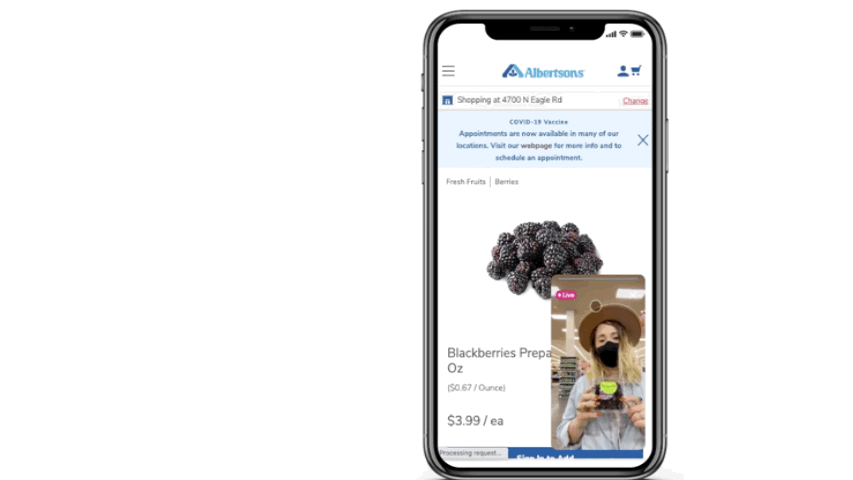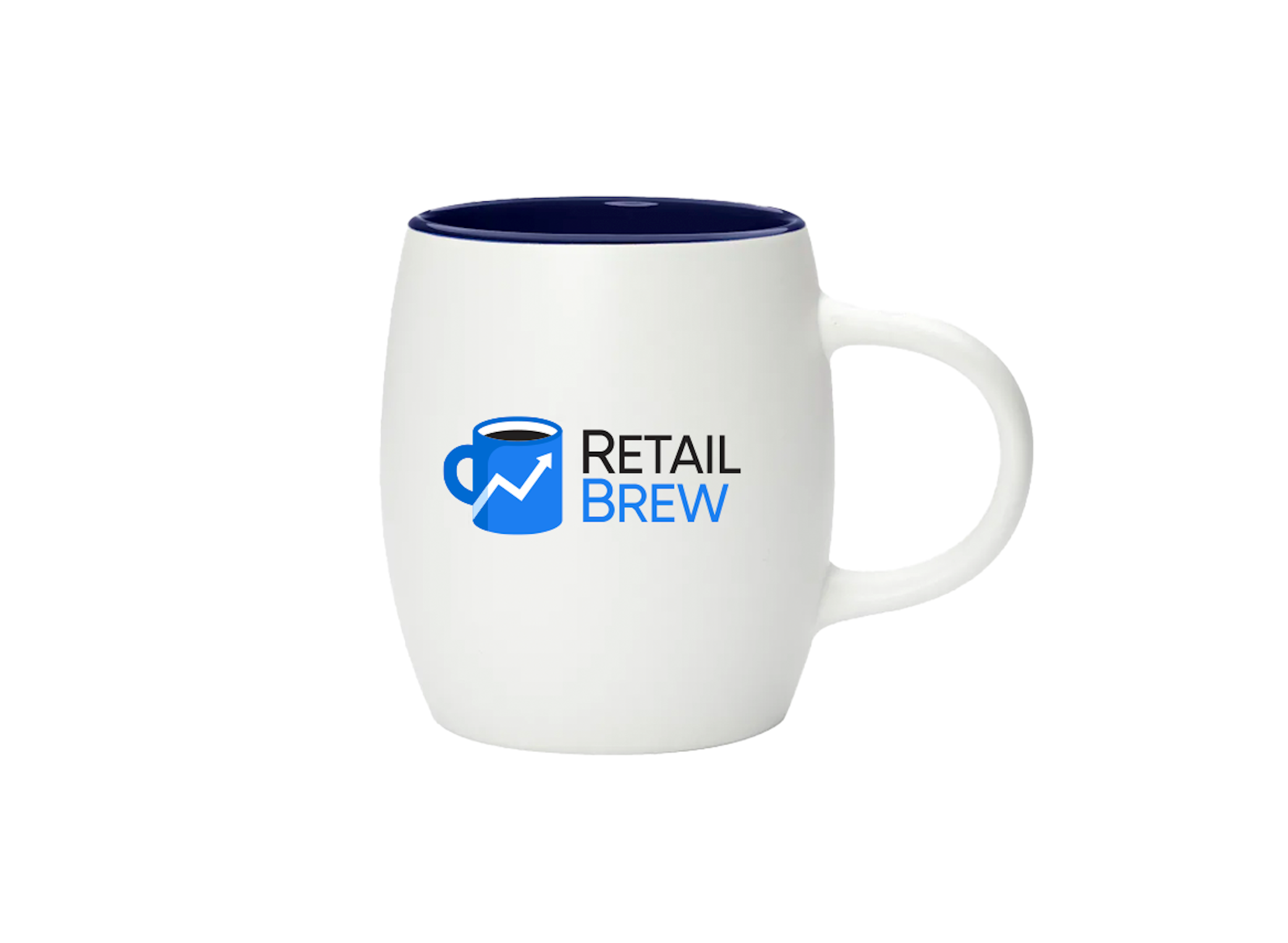Welcome back. It’s that time of day when you’re itching for another cup of coffee. Lucky for you, we’re halfway through our weeklong giveaway, and the only thing stopping you from drinking your afternoon beverage from an awesome Retail Brew mug is just a few referrals.
Refer at least five retail enthusiasts to subscribe to Retail Brew using your custom referral link, and you’ll be sipping in style in no time.
In today’s edition:
- A convo with Last Crumb’s CEO
- Spotlight on furniture resale
- Albertsons gets shoppable
—Katishi Maake, Julia Gray, Jeena Sharma
|
|
|
Who knew selling cookie box drops would be a viable biz? Not Matthew Jung—at least not eight months ago when he joined Last Crumb.
The CEO of the Los Angeles–based cookie company wasn’t sure a drop model was the right move, but after selling “hundreds” of boxes—and notching nearly $1 million in sales in the last four months—it proved to be the right strategy.
- A box of a dozen cookies sells for $140, and Jung said the company’s weekly drops sell out in as little as 20 seconds. The company’s waitlist numbers 50,000+.
The company’s cofounders, Derek Jaeger and Alana Arnold, brought Jung on to build “the Rolex of cookies.”
- He previously started his own DTC companies, including men’s self-care brand Sonne, and served as an advisor to DTC medical-scrubs company FITScrubs and apparel retailer Esby.
We spoke to Jung about Last Crumb’s success thus far. Here are a few takeaways from our conversation.
Deciding on the drop model: While Jung was iffy on drops, he said Last Crumb benefitted from not having any preconceived notions around the company’s biz model. They wanted to create an experience selling luxury cookies.
“When people are launching direct-to-consumer things, there’s this misconception that you start with the business model and then everything else works itself out. In our case, it has worked so well because we actually thought about the sales model after we identified all the things that we wanted to be for our customers.”
The social media strategy: Social media has been key to growing Last Crumb, with the company focusing on Instagram and TikTok. The latter, despite finding success now—#LastCrumb has 13.8 million views on TikTok, thanks to being an unboxing fave—was a challenge at first. Both Jung and Last Crumb’s cofounders felt they didn’t have control over the brand.
“What we realized was that, TikTok, the content doesn’t look as good. It’s kind of weird. It has a lot to do with the music that you’re overlaying. It’s like funny videos that people are reposting. From a brand perspective, from my perspective, I feel like this is a total nightmare.”
Landing funding: Jung said Last Crumb was prepared to bootstrap its operation—telling us the company became profitable within three months of hitting the market this year—but ended up raising roughly $1 million in funding earlier this month to grow faster. The money allowed for a much larger kitchen and new hires (it now has 15+ employees).
“For us, we realized that we could build a really cash-flow-positive business, while at the same time, having kind of a slush fund to look to expansion opportunities.”—KM
|
|
|
The resale revolution is coming for your couch. Chairish, the vintage-furniture platform, has just released its first-ever Resale Report, combining internal data with research from Statista to outline the burgeoning secondhand furniture space.
Back in 2018, Chairish’s report noted that fashion led resale, accounting for 49% of the market, while the home-furnishings category only made up 11%. Apparel still dominates, but last year, home goods climbed among the fastest-growing resale categories.
- The resale furnishings category is projected to grow by 54% by 2025, 3.5x faster than traditional retail, per the report.
- Sales for secondhand furniture are on track to hit $16.6 billion over the next five years, a 70% jump from 2018.
“A lot of this is due to habits that were initiated, formed, and developed in the fashion space that are now migrating into the home area,” Chairish cofounder Anna Brockway explained in a presentation ahead of the report’s release.
Staying home: Of course, those habits were accelerated by the pandemic—to the benefit of Chairish, which saw a 60% increase in sales last year, as well as the furniture industry at large.
“Buyers very quickly became more comfortable buying big-ticket sofas [and] home furnishing items [online] because they needed to,” cofounder Gregg Brockway said.
The drivers? As with fashion, younger sustainability-minded shoppers are leading the trend: 31% of millennial and Gen Z shoppers said Covid boosted their interest in online shopping for used or vintage furniture, per a Chairish/Statista survey.
- 44% of millennials have already resold furniture online.
And, and, and: Brockway nodded to how customers might look to resale to avoid the delays caused by supply-chain issues. “Vintage, by definition, is immediately available and ready to ship.”—JG
|
|
|
|
If you caught our edition on Monday, you’ll remember our friends at Route have been getting ready to launch a rockin’ new product. So without further ado…meet  Route for Merchants Route for Merchants . .
What is it? Here’s the lowdown:
The Route for Merchants platform is a fully integrated suite of e-commerce tools that powers modern post-purchase experiences for merchants and consumers.
This new—and free—platform empowers merchants of any size and industry to offer customers Amazon-level post-purchase experiences—aka experiences that increase online buying satisfaction, decrease customer support costs, and boost bottom-line profits.
There’s a lot to unpack here, so take a peek further down the page to learn more about all the new features that come with Route for Merchants.
Prefer to jump straight into a demo? We’re excited, too. Book one today right over here.
|
|
|
Move over, Instagram shopping: Albertsons will soon let customers buy groceries via live-streaming on its website.
The details: The new initiative is in partnership with short-form video platform Firework, and will roll out starting October 15.
- Phase one will add short cooking content, while phase two will make the videos shoppable and enable live-streaming.
- Phase three (set for January 2022) will introduce a “retail media component,” allowing other brands to put their social media videos onto the grocery giant’s websites and tap into the technology.
Make it fun: This is Firework’s first-of-its-kind partnership with a grocery retailer, but the platform said it is in talks with other grocery stores (plus fashion and beauty brands) across the US to introduce similar initiatives.
“The retail space is doing a tremendous amount with livestream right now,” Jason Holland, Firework’s president of global business, told Retail Brew. “When we were introduced to Albertsons, they leaned forward super progressively and said, ‘We want to completely reinvent the entire digital consumer experience to be entertainment.’”
Zoom out: Albertsons Companies isn’t the first US grocer to dabble with livestream shoppable content; both Kroger and Walmart have introduced shoppable how-to recipe videos.
Most retailers have tried to make social media platforms like TikTok and Instagram work for them (no surprise, that’s where audiences are), but Firework’s pitch is to “decentralize” the livestream shopping realm.
- “It’s not being powered into a social app,” Holland noted of the Albertsons’ partnership. “It’s not being powered into a walled garden.”
+1: Albertsons is also piloting DoorDash’s DoubleDash service, which allows customers to add items from multiple merchants for no extra fee.—JS
|
|
|
-
Store opening announcements increased 58% since 2020, according to Coresight’s latest report.
-
Two US retail industry groups want the government to give them 90 days before implementing new Covid-19 vaccine regulations.
-
CreatorIQ, an influencer marketing platform, acquired Tribe Dynamics, another influencer platform, for an estimated $70 million.
-
ThirdLove, the lingerie startup, is getting into activewear.
-
McDonald’s will “drastically” cut the number of plastic Happy Meal toys by 2025.
-
Vestiaire Collective’s valuation hit $1.7 billion amid resale’s investment boom.
|
|
|
|
Boxes on boxes of features. Route for Merchants just landed, and we’re pretty sure it took a forklift to wheel this baby in. It offers multi-channel package tracking that’s proactive, accessible, and on-brand. It boasts buyer protection that boosts profits and gives customers peace of mind. It delivers engagement features like automatic feeds and customizable profiles that help customers discover your brand and your products. It does it all. Book a demo today.
|
|
|
Today’s top retail reads.
Fluid fashion: Harris Reed is bringing gender-bending fashion design to the mainstream, working with names like Harry Styles and Solange. (the New Yorker)
All in: Nike’s hands-free sneakers were a breakthrough in inclusive, accessible footwear and design tech. But the company knows it still has more to do. (Bloomberg)
For sale: A Swedish company opened what’s maybe the first border/port shop inside a shipping container in Wales, selling duty-free goods to travelers. (Forbes)
|
|
|
ICYMI, here’s how to enter this week’s giveaway: Refer at least five of your friends and colleagues to subscribe to Retail Brew using your custom referral link.
Remember, the challenge ends this Sunday (9/26) at 11:59pm ET. Don’t sleep on this opportunity like you slept on Emma Raducanu’s winning her first US Open—get those referrals in before it’s too late!
*US winners only. For more rules, see terms and conditions here.
|
|
|
On Wednesdays, we wear pink spotlight Retail Brew’s readers. Want to be featured in an upcoming edition? Click here to introduce yourself.
Even before legalization was on Canada’s horizon, Kayleigh Donahue knew she wanted to work in the cannabis space. (She even started her own small biz growing industrial hemp.) Fast forward to 2018, when legalization became a reality, and Donahue got her chance: She joined Kiaro, a Canadian cannabis retailer, as an analyst and is now the company’s VP of business development and licensing. Keep reading for the lowdown.
How would you describe your job to someone who doesn’t work in retail? I find and license physical locations for cannabis retail and look for complementary revenue diversification opportunities.
One thing we can’t guess about your job from your LinkedIn profile: Cannabis retail is a lot like Monopoly—it’s all about leasing the right spaces and trading with other players.
What’s your favorite project you’ve worked on? Our public listing on the Toronto Stock Exchange in 2020. It was so satisfying to watch a startup grow from the ground up and complete this rite of passage.
Tell us your favorite retail accounts to follow: Cannabis Retailer Business Magazine, Headset, BDSA, and Business of Cannabis.
Hands down, the best fast food restaurant chain is…A&W. Teen Burger forever!
|
|
|
Catch up on the Retail Brew stories you may have missed.
|
|
|
Enjoying the newsletter? Share it with your network to take advantage of our rewards program.
When you reach 3 referrals, you'll be invited to Monthly Exclusive Events with our co-founder Alex and the biggest names in business.

Hit the button below to learn more and access your rewards hub.
Click to ShareOr copy & paste your referral link to others:
morningbrew.com/retail/r/?kid=303a04a9
|
|
|
Written by
Katishi Maake, Julia Gray, and Jeena Sharma
Was this email forwarded to you? Sign up here.
|
ADVERTISE // CAREERS // SHOP // FAQ
Update your email preferences or unsubscribe here.
View our privacy policy here.
Copyright © 2021 Morning Brew. All rights reserved.
22 W 19th St, 8th Floor, New York, NY 10011
|
|











